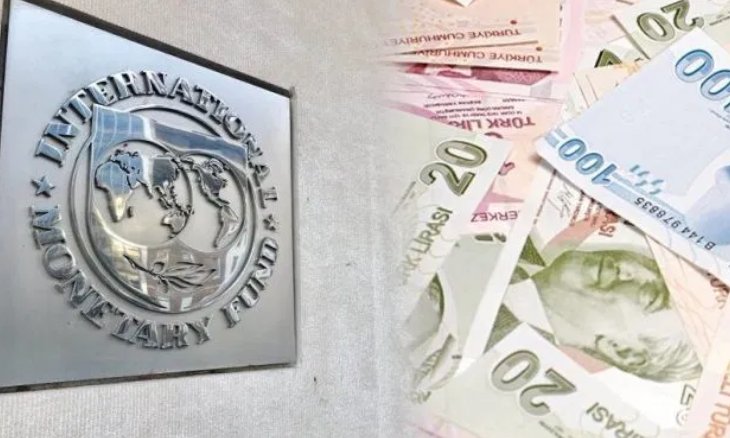IMF warns of external and domestic risks for Turkish economy
The current calm in the Turkish economy appears to be fragile unless stronger and more resilient growth over the medium term is secured, according to a recent IMF statement. The IMF also warned that the prospects of a sustainable recovery from last year’s currency crisis have dimmed.
DUVAR ENGLISH
Turkey is vulnerable to external and domestic risks, the International Monetary Fund said on September 23, with an assessment that the main policy challenge was "to move from a short-run growth focus to securing stronger and more resilient growth over the medium term."
"The current calm appears to be fragile," the IMF wrote in its statement after an Article IV visit to Turkey by its staff. While "reserves remain low, and private sector FX debt and external financing need to be increased".
"The main policy challenge is to move from a short-run growth focus to securing stronger and more resilient growth over the medium term. This could be achieved through a five-pronged policy response," the statement said.
In a concluding statement published after an annual visit by IMF staff, the fund increased its forecast for Turkey’s economic growth significantly from -2.5 percent to +0.25 percent for 2019. The IMF also warned that the prospects of a sustainable recovery from last year’s currency crisis have dimmed. The Fund noted that “Growth has rebounded, aided by policy stimulus and favorable market conditions, following the sharp lira depreciation and associated recession in late-2018. The lira has recovered and the current account has seen a remarkable adjustment.”
The report warned, however, that “the current calm appears fragile,” citing concerns about bad debts in the corporate sector, low foreign currency reserves and the country’s heavy reliance on foreign financing as well as a growing fiscal deficit, Reuters reported.
Turkish President Recep Tayyip Erdoğan, seeking to resume Turkey's strong growth path is now attempting to kick-start the supply of credit via rapid interest rate cuts and incentives for banks to lend. The IMF pointed at some of these measures, warning that the central bank’s decision to slash rates by 7.5 percentage points since July was “too aggressive” and added that the reduction in reserve requirements for banks that meet certain lending targets “should be revisited.” Efforts to expand lending, it said “should be limited and should also ensure that resulting credit is provided only to viable borrowers.”

Below are the highlights from the IMF's Turkey Article IV Report:
- The main policy challenge is to move from a short-run growth focus to securing stronger and more resilient growth over the medium term. This could be achieved through a five-pronged policy response: - a tight monetary policy to boost central bank credibility, underpinning the lira, durably lowering inflation and strengthening reserves; – steps to bolster medium-term fiscal strength; – a comprehensive third party assessment of bank assets and new stress tests with follow-up measures, as needed, to further strengthen confidence in banks; – additional steps, building on existing reforms, to strengthen the insolvency and corporate restructuring framework; and - focused structural reforms to support productivity growth and increase economic resilience.
- Durably lowering inflation remains the most important challenge for monetary policy and is the best way to permanently cut interest rates. … in the staff’s view, the CBRT easing cycle has been too aggressive given still-high inflation expectations and the need to mitigate macro-financial risks. The monetary policy should keep rates on hold until there is a durable downturn in inflation and inflation expectations.
- Fiscal policy—a longstanding strength for Turkey—should remain a key anchor. …in the staff’s view, a neutral fiscal stance next year would still support growth, allowing automatic stabilizers to work, but further discretionary stimulus should be avoided to contain financing needs and preserve fiscal space. Measures of about 1½ percent of GDP over the medium term would help stabilize the debt burden around current, commendably low, levels.
- Further monitoring of extra budgetary institutions would also be welcome. …in this regard, the investment mandate of the recently-established Turkey Wealth Fund (TWF) risks fragmenting management of public spending outside of the budgetary process. The TWF’s governance structure could also be refined to limit potential conflicts of interest.
- Further steps to clean up bank and corporate balance sheets would support financial stability and stronger and more resilient growth over the medium term . … an early comprehensive third-party asset quality review (AQR) and ensuing stress tests, accompanied, to the extent needed, by further measures, would help shore up market confidence.
- Actions to support credit growth should be limited. Efforts to expand lending, including through state banks and the CGF, should be limited and should also ensure that resulting credit is provided only to viable borrowers.
- Focused structural reforms would improve prospects for stronger sustainable growth and increase the economy’s resilience to shocks. Product market efficiency, … addressing barriers to competition and allowing automatic energy pricing adjustments, the quality of human capital could be raised by upgrading education and on-the-job training; early childhood education and childcare could further increase female labor force participation; labor market flexibility could be improved by eliminating backward-looking public wage indexation and aligning minimum wages with expected inflation and productivity; severance pay could be reformed to encourage labor mobility.
- Governance reforms could also help growth prospects. …regulatory predictability and simplifying administrative procedures… transparency. Improvements in governance could also magnify structural reform payoffs.
